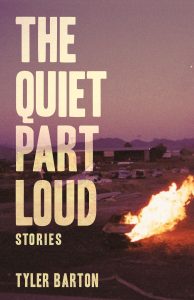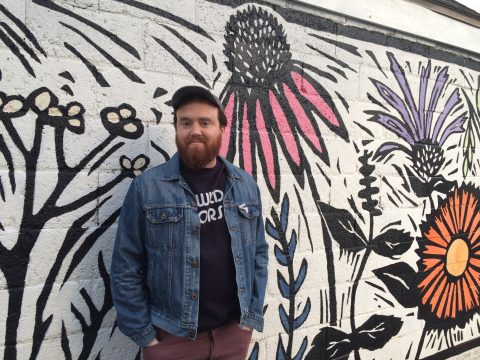This week’s reader, Tyler Barton, will give a copy of his new chapbook, The Quiet Part Loud, to the writer of the story he selects for publication!
Your chapbook, The Quiet Part Loud, won the 2017 Turnbuckle Chapbook Contest and was recently published by Split Lip Press. Congratulations! Can you tell us a little bit about it? Are there certain themes you explore in the book?
I wish I could say that this collection was the result of a series of deliberate and coordinated artistic decisions, with a solid theme that I explored from eleven different angles. But the truth is that I had been writing and publishing flash sporadically for 4 years, and when I saw that Kara Vernor (one of my favorite flash writers) was judging Split Lip’s Chapbook Contest, I started pulling together my favorite flash pieces. The decision to make a flash collection was so haphazard that I actually stole the title of my then in-progress full-length short fiction manuscript (Get Empty) and submitted the chapbook under that title, because I was certain I would not win.
 It turns out the book does have a theme, and this was discovered during the last round of pre-publication edits. The stories are about (mostly male) teenagers who want in some way to be seen. This causes them to do ridiculous, dangerous, rude, funny, sometimes tragic, sometimes beautiful things. I ended up changing the chapbook title at the last minute, because I realized that Get Empty truly was THE title for my full-length collection, the only title that worked. The Quiet Part Loud came from a title-generating session that I held on one of the last days of a residency last October in the Adirondacks. (Thanks to my residency-mates for the help!)
It turns out the book does have a theme, and this was discovered during the last round of pre-publication edits. The stories are about (mostly male) teenagers who want in some way to be seen. This causes them to do ridiculous, dangerous, rude, funny, sometimes tragic, sometimes beautiful things. I ended up changing the chapbook title at the last minute, because I realized that Get Empty truly was THE title for my full-length collection, the only title that worked. The Quiet Part Loud came from a title-generating session that I held on one of the last days of a residency last October in the Adirondacks. (Thanks to my residency-mates for the help!)
You are co-founder of Fear No Lit, which sponsors the Submerging Writer Fellowship, back for a second year this year (submissions are open until June 1!). How did this fellowship emerge (pardon the pun)? What are your goals for the fellowship?
This project began as a joke. Erin Dorney (my partner and co-founder of FNL) and I were joking about all these emerging writer opportunities, and one of us quipped, “What about submerging writers?” I tweeted it, got some positive feedback. Then we thought: shit, someone is going to steal this idea. We had to make it happen.
The goal is to provide one writer with the kind of boost that can start a career (or at least start the start of a career) of a writer who deserves to have begun a career already. We invite free applications that include a writing sample and brief answers to essay questions (What makes you a submerging writer? Where do you find hope? What’s the biggest mistake you’ve ever made? What does community mean to you?). We choose ten finalists, send to our judge (Tyrese freaking Coleman!) and then she’ll choose three finalists and a winner. The winner gets cash, a free registration of their choice, and chapbook publication.
In short, we want to celebrate the struggle of writing, to inspire a more open conversation about how hard it can be to keep on writing when success is elusive.
You have quite a lot of experience with readings, from reading your own work to hosting literary events. What advice do you have for people new to reading their work (or even for more seasoned readers who are looking to improve)?
This is my favorite topic right now. And I just went to an amazing panel on this at AWP (hosted by Angel Nafis, Hieu Minh Nguyen, and other great readers). They said that you should only read things that you still have room to re-discover. I take this to mean: Read things that still feel new, or still have the potential to be new. If you read the poem or story you’ve read 100 times, maybe you won’t miss a single word, but you also might start thinking about what beer you’re going to order after the event.
A few nights ago, I gave the best reading I think I ever gave because I read a new flash story that I had worked on obsessively, practiced 5 times, and then read at the reading. The piece is still so filled with things that make me laugh, phrases that surprise me, and moments that make me feel connected to something larger than myself. Also, my reading clocked in just under 5 minutes. Because here’s the other thing: never read longer than 15 mins if you are a feature. If you are on a reading with 5 other writers, don’t read longer than 5-7 mins. Just don’t. Regardless of how long the organizer, your friend, or your ego tells you to read.
Lastly, what our readers always want to know is what kind of story would you love to find in your queue this week?
I look for loud prose, loud prose with texture. I want to see that the writer had fun writing the piece. That said, I love to be surprised by what I didn’t know I wanted. All I can say definitively is that if your story is about a character with a dead parent, friend, spouse, or child, it better be FRESH AS HELL, and even so, it probably will still turn me away. Nothing against the dead. There’s just so many dead people in flash fiction, in all fiction. Keep in mind what Kathy Fish told me in our recent Split Lip Interview: Every story does not have to be life or death.


 The SmokeLong Grand Micro Contest (The Mikey) is now an annual competition celebrating and compensating the best micro fiction and nonfiction online.
The SmokeLong Grand Micro Contest (The Mikey) is now an annual competition celebrating and compensating the best micro fiction and nonfiction online.